Blindness
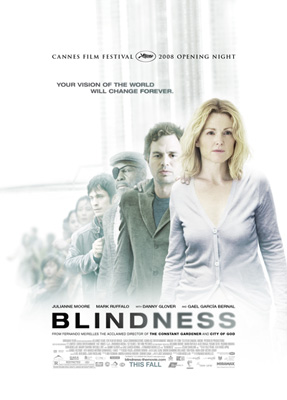
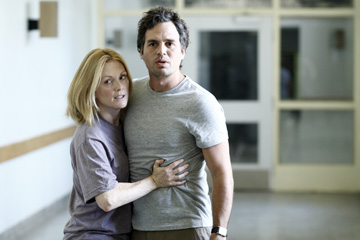 The disease that strikes this unnamed city is not explained, which is probably for the best. I can understand that. Here are some things I don't understand about this movie. Why does no one have a name? Watching the film, I couldn't remember anyone being identified as anything, and sure enough when the credits come, the characters are not named, but rather described. ("Woman with Dark Glasses", "Man with Eye Patch", etc.) Not only does this put us at a curious distance with the entire cast, it prevents them from having any real personality. People infected with the disease are placed in quarantine camps, and separated into groups. Each group acts with a pack mentality. There's a good one, and an evil one, and no one in either group is allowed to have an individual personality from anyone else. Not even the hero of the story (a woman who somehow is immune to the disease) manages to stand out much from those around her. We spent most of the film's time watching the cast stumble about the sets, and the screenplay ignore any potential the idea may have.
The disease that strikes this unnamed city is not explained, which is probably for the best. I can understand that. Here are some things I don't understand about this movie. Why does no one have a name? Watching the film, I couldn't remember anyone being identified as anything, and sure enough when the credits come, the characters are not named, but rather described. ("Woman with Dark Glasses", "Man with Eye Patch", etc.) Not only does this put us at a curious distance with the entire cast, it prevents them from having any real personality. People infected with the disease are placed in quarantine camps, and separated into groups. Each group acts with a pack mentality. There's a good one, and an evil one, and no one in either group is allowed to have an individual personality from anyone else. Not even the hero of the story (a woman who somehow is immune to the disease) manages to stand out much from those around her. We spent most of the film's time watching the cast stumble about the sets, and the screenplay ignore any potential the idea may have.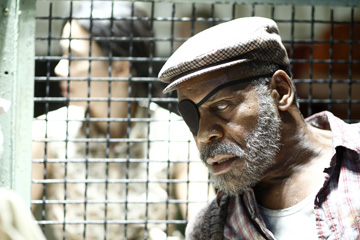
At the very least, Blindness manages to hold our attention for the first half. As soon as the opening titles fade, a Japanese man in a car (Yusuke Iseya) is struck by the disease in the middle of traffic. His wife (Yoshino Kimura) takes him to an eye doctor (Mark Ruffalo), but the doctor sees nothing wrong with the man. The next day, the doctor himself awakens to discover that he is blind, though his wife (Julianne Moore) is not infected. She pretends she's been blinded anyway, so that she can follow her husband to the quarantine camp and be with him. The disease spreads, and the number of people in the quarantine camp increases to the point that people are choosing sides, and turning against each other. When food rations start running low, the more greedy people in the camp band together to horde the food from the others, and force them to pay with valuables or forced sex for meager food rations. You'd think since one side has a woman who actually can see, they'd have the advantage. But no, she keeps on pretending that she's blind, and even agrees to be raped by the more evil patients so that the people in her ward can get food.
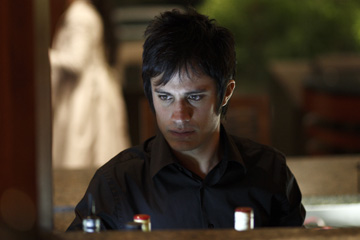 The same ideas keep on being repeated over and over. We watch people struggling to adjust to their blindness, we see them suffer and starve, and we see them stumble around as they try to figure out why this is happening to them. I was trying to figure out why this is supposed to be entertaining. It's not that I don't think an entertaining movie could be made out of this idea. With the right approach, this could have been highly engaging. But the movie loses its way fairly quickly. For a long time, it never shows us what's going on outside the quarantine camp. We're stuck entirely within its walls, giving the film a claustrophobic feel I'm sure this was intentional, but I was more interested in what was going on outside the walls. How was the government reacting to this? Is this epidemic contained only to this city, or is it on a more global scale? There is one scene where a patient talks about stuff he's heard about what's going on outside the quarantine shelter, and we see some images of the outside world falling into chaos as the disease spreads, but it's never elaborated on. After this brief tease, we go right back to watching the same people suffer needlessly and endlessly.
The same ideas keep on being repeated over and over. We watch people struggling to adjust to their blindness, we see them suffer and starve, and we see them stumble around as they try to figure out why this is happening to them. I was trying to figure out why this is supposed to be entertaining. It's not that I don't think an entertaining movie could be made out of this idea. With the right approach, this could have been highly engaging. But the movie loses its way fairly quickly. For a long time, it never shows us what's going on outside the quarantine camp. We're stuck entirely within its walls, giving the film a claustrophobic feel I'm sure this was intentional, but I was more interested in what was going on outside the walls. How was the government reacting to this? Is this epidemic contained only to this city, or is it on a more global scale? There is one scene where a patient talks about stuff he's heard about what's going on outside the quarantine shelter, and we see some images of the outside world falling into chaos as the disease spreads, but it's never elaborated on. After this brief tease, we go right back to watching the same people suffer needlessly and endlessly.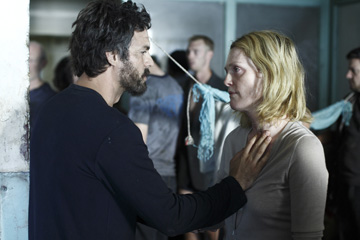 Blindness isn't just an ugly movie at its core, it's ugly to look at as well. Director Fernando Meirelles (The Constant Gardner) shoots his scenes one of two ways - Either extremely over exposed, so that the actors appear to be standing in the middle of a vast, empty, white background, or in such deep shadows and murky colors that you almost want to spray window cleaner on the screen. This was obviously an artistic choice, but it is one I quickly grew tired of. I think a more realistic style would have fit this movie more. Shooting the backgrounds in such a glowing milk-white color gives the movie a distracting dream-like quality. Not that it would matter much, anyway. The visuals are about the only thing worthy of the audience's attention. Without them, there would not be a lot to say about the movie, since it keeps us at a constant distance from its characters, almost any sort of feeling, and very little motivation.
Blindness isn't just an ugly movie at its core, it's ugly to look at as well. Director Fernando Meirelles (The Constant Gardner) shoots his scenes one of two ways - Either extremely over exposed, so that the actors appear to be standing in the middle of a vast, empty, white background, or in such deep shadows and murky colors that you almost want to spray window cleaner on the screen. This was obviously an artistic choice, but it is one I quickly grew tired of. I think a more realistic style would have fit this movie more. Shooting the backgrounds in such a glowing milk-white color gives the movie a distracting dream-like quality. Not that it would matter much, anyway. The visuals are about the only thing worthy of the audience's attention. Without them, there would not be a lot to say about the movie, since it keeps us at a constant distance from its characters, almost any sort of feeling, and very little motivation.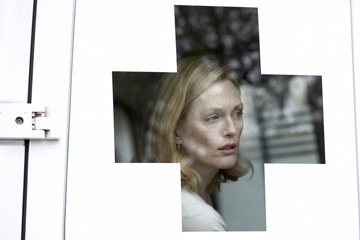
See the movie times in your area or buy the DVD at Amazon.com!






0 Comments:
Post a Comment
<< Home